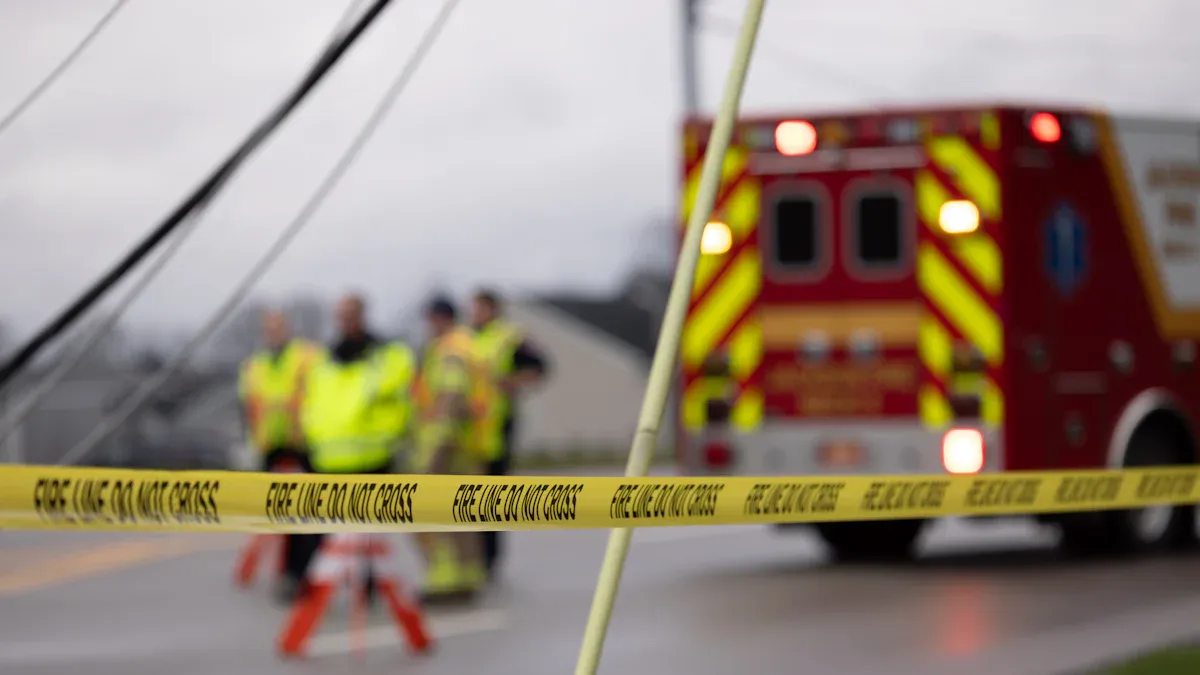Image Source: pexels
Feeling lost after a car accident is normal, but a ‘Comprehensive Guide to Car Accident Claims: From Incident to Settlement’ can help you navigate the process. Learning about claims empowers you to stay in charge. Knowing your rights keeps you safe and ensures you receive fair payment. If problems arise, understanding your options helps you remain prepared and calm.
Key Takeaways
- Stay safe after a crash. Move to a safe spot, check for injuries, and call 911 right away.
- Collect proof at the scene. Take pictures, get witness names, and write down details to help your case.
- Tell your insurance company about the crash soon. Share only needed facts and don’t say it was your fault.
Immediate Steps After an Accident
Stay Safe and Call for Help
Your safety is the most important thing after a car accident. Move to a safe spot if you can and check for injuries. Call 911 right away to report the accident and ask for medical help if needed. Emergency workers will keep everyone safe and record what happened. Staying calm and focused can really help during this time.
Tip: Never leave the accident scene, even if it’s small. Leaving could get you into legal trouble.
Gather Evidence at the Scene
Collecting evidence at the accident scene helps your claim. Use your phone to take pictures of the cars, license plates, and any injuries. Take photos of the road, signs, and skid marks too. Share contact and insurance details with the other drivers. If there are witnesses, ask for their names and phone numbers.
How to collect evidence:
- Take clear photos with timestamps.
- Write down what happened while it’s fresh in your mind.
- Keep all evidence in one place for later use.
Report to Police and File a Report
Filing a police report is very important for legal and insurance reasons. Many states require you to report accidents with injuries or big property damage.
| State | When to Report | Deadline |
|---|---|---|
| California | Death, injury, or damage over $1,000 | 10 days |
| Florida | Death, injury, or damage over $500 | As soon as possible |
| Texas | Death, injury, or damage over $1,000 | Immediately/10 days |
Check your state’s rules to make sure you follow them. A police report is an official record that can help a lot with your claim.
Get Medical Help Right Away
Even if you feel okay, see a doctor as soon as you can. Some injuries, like whiplash or internal problems, might not show up right away. Waiting to get treated could hurt your health and your claim. Insurance companies might say your injuries didn’t come from the accident.
Note: Seeing a doctor quickly creates proof that links your injuries to the accident. This is key for getting fair payment.
Doing these steps keeps you safe and makes your case stronger. Following this "Comprehensive Guide to Car Accident Claims: From Incident to Settlement" will help you handle the process with ease.
Filing a Claim
Tell Your Insurance Company
After a car accident, tell your insurance company quickly. Call them soon to report what happened. Share only the important details about the accident. Don’t give extra information that isn’t needed. Insurance adjusters might use extra details to lower your claim. Stick to the truth and let your evidence explain the situation.
Tip: Don’t say the accident was your fault. Even if you think you made a mistake, let the investigation decide who is responsible.
Send in Needed Documents
Sending the right papers helps your claim move faster. Collect and organize these items:
- Witness Statements: What people saw during the accident.
- Police Report: The official record of what happened.
- Medical Records: Proof of injuries and medical costs.
- Financial Loss Documentation: Records of lost wages or repair bills.
- Vehicle Damage Evidence: Photos or repair estimates of your car.
- Dashcam Footage: Video proof of the accident.
Keep these papers safe and make sure they are correct. Missing or wrong documents can slow things down or cause your claim to be denied.
Know Deadlines and Policy Rules
Every insurance policy has its own rules and time limits. Most ask you to file a claim "soon" or "within a reasonable time." For example, in New York, you must file a no-fault claim within 30 days of the accident unless you have a good reason for being late. Missing deadlines can hurt your claim.
Read your policy carefully to know what you need to do. If you’re unsure, ask your insurance company for help. Knowing the rules and deadlines keeps you on track and avoids problems.
By following these steps, you can handle the claims process with ease. This part of the Comprehensive Guide to Car Accident Claims: From Incident to Settlement helps you stay in control and work toward a fair outcome.
Working with Insurance Companies
What Does an Insurance Adjuster Do?
When you file a claim, an insurance adjuster will handle it. They check the accident details and decide how much to pay. Adjusters look at medical records and property damage. They also talk to witnesses and review what happened. Their job is to make sure the claim is valid.
Note: The adjuster works for the insurance company, not for you. Their goal is to save money while settling claims fast.
How to Talk to Your Insurance Company
Talking clearly with your insurance company helps your claim. Follow these tips to stay organized:
- Write down every call or meeting, including dates and names.
- Send written notes to confirm any verbal agreements.
- Answer requests quickly and show proof of your losses.
- Stay calm and avoid getting upset.
- Remember, your conversations might be recorded.
Tip: Be polite and firm. A respectful tone helps build trust with the adjuster.
How to Negotiate a Settlement
Negotiating is an important step in getting a fair deal. Collect all your evidence, like medical bills and repair costs. Decide on the amount you think is fair. Be ready to explain your side with facts.
Adjusters may try to lower the payment by offering less or blaming you. Stand your ground and speak up for yourself. If talks don’t work, ask a lawyer for help to protect your rights.
By knowing the adjuster’s role, staying clear in communication, and being confident in talks, you can handle this process well. This part of the Comprehensive Guide to Car Accident Claims: From Incident to Settlement helps you stay in control and get a fair result.
Understanding Settlement Amounts
Economic Damages: Medical Bills and Lost Wages
Economic damages are the money losses from a car accident. These are easy to figure out because they use real costs and receipts.
Some examples of economic damages include:
- Medical costs like hospital visits, medicines, and therapy.
- Money lost from missing work due to injuries.
- Travel costs for going to doctor appointments.
- Paying for help with chores or personal care.
To get the most from your claim, keep all receipts and bills. For instance, save proof of buying medical items or paying for therapy. If you can’t work, write down how much money you’ve lost and might lose later. These records will make your case stronger and help you get fair payment.
Tip: How serious your injuries are and how well you keep records will affect your settlement.
Non-Economic Damages: Pain and Suffering
Non-economic damages cover the emotional and physical pain from the accident. These are harder to calculate because they don’t have exact costs. Pain, sadness, and losing enjoyment in life are part of this.
Insurance companies use two ways to figure out these damages:
- Multiplier Method: They multiply your money losses by a number (like 1.5 to 5) based on how bad your injuries are.
- Per Diem Method: They give a daily dollar amount for your pain and multiply it by the days you’ve suffered.
Things like how long it takes to heal and how your life changes affect the amount. For example, if you can’t enjoy hobbies or spend time with family, you might get more money.
Note: Non-economic damages are personal, so explain how the accident changed your life to help your claim.
Factors Influencing Settlement Value
Many things can change how much money you get in a settlement. These include:
- The insurance policy limits. Small policies may pay less, while bigger ones allow more.
- How the insurance company handles claims. Some may offer less or deny claims.
- How bad your injuries are and how strong your proof is. Good records and medical reports can help your claim.
Knowing these factors helps you stay ready and speak up for yourself. By using this Comprehensive Guide to Car Accident Claims: From Incident to Settlement, you can handle the process confidently and aim for a fair result.
Resolving Disputes
Why Claims Get Denied
Insurance companies might say no to claims for many reasons. This can leave you upset and unsure of what to do. Knowing these reasons can help you avoid mistakes:
- Waiting too long to see a doctor after the accident.
- Asking for more money than your policy allows.
- Filing a claim for someone not covered by your insurance.
- Breaking traffic rules or driving carelessly.
Other common reasons include:
- Not paying your insurance bills on time.
- Driving while drunk or under drugs during the accident.
- Sending in wrong or incomplete paperwork.
Understanding these problems can help you prepare better and make your claim stronger.
Tip: Read your policy carefully and act fast after an accident to avoid denials.
How to Fight a Denied Claim
If your claim is denied, don’t give up. You can fight back by doing these things:
- Gather proof like pictures of the crash and car damage.
- Get police reports and witness accounts to support your case.
- Add repair costs and doctor’s notes to show your losses.
- Write a formal letter to appeal. Mention your policy rules and include all proof.
Being organized and determined can really help. A strong case with good proof can change the decision in your favor.
Note: Save copies of all letters and papers for your records.
When to Get a Lawyer
Sometimes, you need a lawyer to help solve problems. Think about hiring one if:
- You or others have serious injuries needing long-term care.
- There’s a fight over who caused the accident.
- The insurance company says no, offers too little, or takes too long to pay.
- The crash involves many cars, big trucks, or hit-and-runs.
A good lawyer can protect your rights and gather proof. They can also talk to the insurance company for you and help you get fair payment.
Reminder: Getting legal advice early can save you time and stress later.
By knowing why claims get denied, how to appeal, and when to ask for legal help, you can stay in control and work toward a fair solution.
Finalizing the Settlement
Checking and Agreeing to the Offer
Before saying yes to a settlement, look at everything closely. This choice is final, so make sure it meets your needs.
- Think about your medical care and how much more you might need. Check if the settlement covers future medical costs.
- Add up lost wages and think about how long you can’t work.
- Look at all damages in the offer, like medical bills, lost income, pain, and car repairs.
Talking to a lawyer can help you decide if the offer is fair. They can explain if it’s enough for your injuries and future needs. Once you agree, you can’t ask for more money later. Take your time to make sure the settlement is right for you.
Tip: Don’t rush to sign anything. Careful checking helps you get what you deserve.
How Payments Work and Timing
How fast you get paid depends on your case. Small accidents with just car damage are quicker, often done in days or weeks. But cases with injuries or arguments can take months or years.
Here’s what usually happens:
- Saying yes early means faster payment.
- Collecting medical and job records takes 1 to 4 months.
- Hard cases or trials can take over a year to finish.
Be patient. Waiting longer can mean getting a better deal. It’s worth it to get the right amount of money.
Note: Keep notes of all talks with the insurance company to know when to expect payment.
Staying Safe After the Settlement
After the settlement is done, keep all papers safe. These might help if questions come up later.
If you feel forced to take a bad deal, remember you have choices. A lawyer can explain your rights and make sure you’re treated fairly.
Reminder: Your health and future are most important. A good settlement should help you recover and plan ahead.
By checking the offer carefully, knowing payment timelines, and protecting your rights, you can move forward with confidence.
Handling a car accident claim might seem hard, but learning helps you stay in charge. Keeping good records and talking clearly are very important. Know your deadlines and insurance rules to protect yourself. If problems come up, a lawyer can help you get treated fairly. By staying ready and not giving up, you can get the settlement you need.
FAQ
What should you do if the other driver doesn’t have insurance?
You can file a claim under your uninsured motorist coverage. This protects you when the at-fault driver lacks insurance. Check your policy for details.
How long does it take to settle a car accident claim?
The timeline depends on the case. Simple claims may resolve in weeks, while complex ones involving injuries or disputes can take months or longer.
Can you still file a claim if you were partially at fault?
Yes, many states follow comparative negligence laws. You can recover damages, but the amount may reduce based on your percentage of fault.




